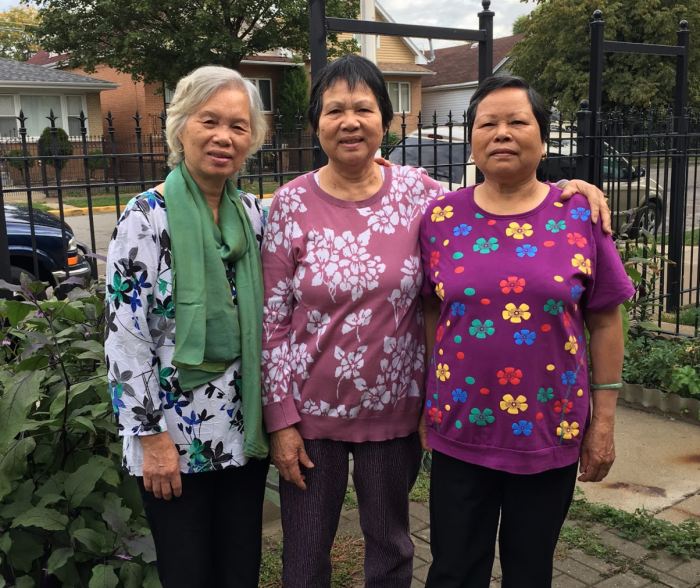This post originally appeared on the Chinese American Healthy Aging blog.
95% of the older U.S. Chinese population in Chicago rely on kin-centered social networks for support and resources, according to an aging study focused on the Chinese population. But echoing a popular Chinese idiom, what is rare is more valuable (物以稀為貴), may make friendship an outstanding predictor of physical and mental health beyond 60, especially for immigrants.
Mrs. Liang, Mrs. Wu and Mrs. Ma each emigrated to Chicago from a city called Toishan in Guangdong, China, in the mid 1990s. They met at the Chinatown Branch of the Chicago Public Library. Speaking the same dialect, Toishanese, and living within 10 minutes walk from each other, they started to spend more time together since then and have been friends for about 15 years.

Mrs. Liang, Mrs. Wu and Mrs. Ma.
“If I don’t get a call from any of these two on any day of the week, I will be a bit worried for them,” she said, “I will want to know if they are doing okay.”
“We haven’t had an argument since being friends,” Ma said, “ever.”
A study drawing on survey data of 3158 Chinese older adults living in the Greater Chicago area discovered that support from friends increases the sense of community, which includes sense of belonging, sense of having an influence in the community and feeling emotionally connected. The study is a part of a long-term public health research project called The Pine Study that investigates aging and health issues unique to the Chinese population at the Rush University Medical Center’s Chinese Health, Aging and Policy Program based in Chicago.
Having a sense of the community plays a vital role in buffering against the stress experienced in the acculturation process and protecting the mental and the overall well-being of older Chinese immigrants.
In Wu’s opinion, without such close friends in her neighborhood, she would be very lonely. She said nothing else, neither money nor other kinds of material help, would matter as much as emotional support to her.
Keeping an intimate, long-term friendship may influence many facets of life outside of sense of community.
Another recent study published by The Pine Study found that having support from friends matters a great deal to better managing daily tasks for older adults of the U.S. Chinese population, too.
In Liang, Wu and Ma’s experience, they help each other grow vegetables.
“We are best at different things to compliment each other,” Wu said, “by sharing the best of our own vegetables.”
Ma has the best Chinese Okra, Wu has the best pumpkins and white gourd and Liang, the best bitter gourd.

The trio’s veggie gardens.
Managing daily tasks, however, means more than just gardening. Getting regular cancer screenings, for instance, is also instrumental for older adults.
In the Pine Study, the association between cancer screening behavior and supportive social networks has come to light: greater support from families and friends is indicative of higher utilization of breast cancer screening but lower utilization of colon cancer screening.
The influence of friendship on mental and physical health isn’t limited to the Chinese immigrant population in the U.S. A study based on more than 270,000 people in 100 different countries found while family ties make great contributions to better health across the lifespan, supportive friendship does a better job at creating resistance to declining physical and cognitive functions at advanced ages.
So seize the day and re-bond with your friends whenever you can. Let friendship help you embrace aging with courage and gratitude.
Direct quotes have been translated from Toishanese/Cantonese into English.
The opinions expressed in this article are those of the author and do not necessarily reflect those of the Diverse Elders Coalition.

